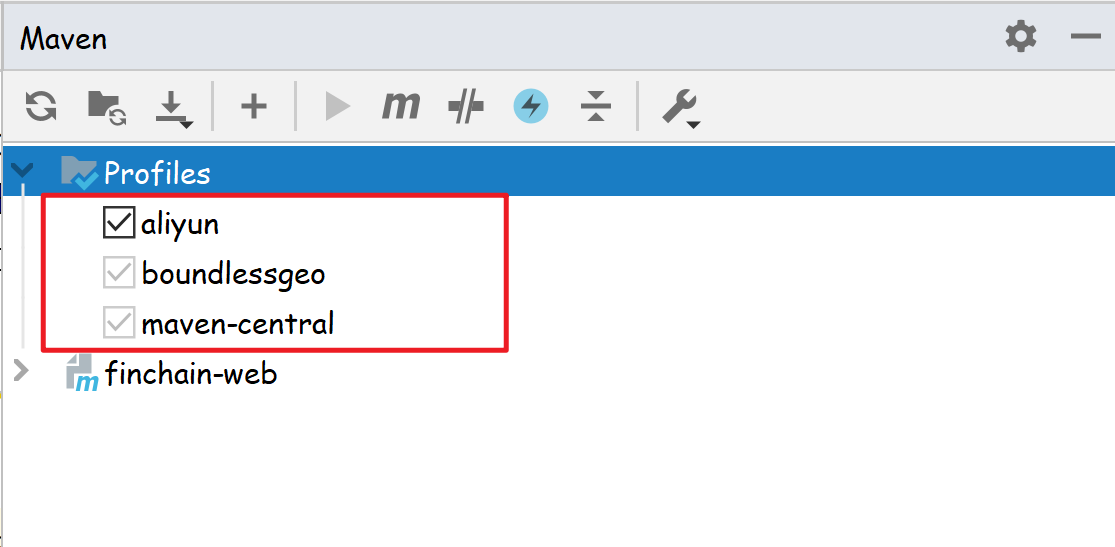Maven
在项目中使用Maven管理jar包依赖,往往会出现以下状况:
1、国内访问maven默认远程中央镜像特别慢;
2、使用阿里的镜像替代远程中央镜像;
3、阿里云镜像中缺少部分jar包;
4、同时使用私有仓库和公有仓库;
针对以上情况,就需要让Maven支持多仓库配置。
单独仓库配置
当只配置一个仓库时,操作比较简单,直接在Maven的settings.xml文件中的<mirrors></mirrors>标签中进行全局配置即可,以阿里云的镜像为例:
<mirrors><mirror><id>alimaven</id><name>aliyun maven</name><url>http://maven.aliyun.com/nexus/content/groups/public/</url><mirrorOf>central</mirrorOf></mirror></mirrors>
只用新增一个mirror配置即可。要做到单一仓库,设置mirrorOf到。
mirrorOf中配置的星号,表示匹配所有的artifacts,也就是everything使用这里的代理地址。上面的mirrorOf配置了具体的名字,指的是repository的名字。
镜像配置说明:
1、id: 镜像的唯一标识;
2、name: 名称描述;
3、url: 地址;
4、mirrorOf: 指定镜像规则,什么情况下从镜像仓库拉取。其中, : 匹配所有,所有内容都从镜像拉取;
external:: 除了本地缓存的所有从镜像仓库拉取;
repo,repo1: repo或者repo1,这里的repo指的仓库ID;
,!repo1: 除了repo1的所有仓库;
环境仓库配置激活
:::danger
针对多仓库的配置在<mirrors></mirrors>标签中多配置几个mirror并不会生效。
:::
正确的操作是在profiles节点下配置多个profile,而且配置之后要激活。
<profiles><profile><id>boundlessgeo</id><repositories><repository><id>boundlessgeo</id><url>https://repo.boundlessgeo.com/main/</url><releases><enabled>true</enabled></releases><snapshots><enabled>true</enabled><updatePolicy>always</updatePolicy></snapshots></repository></repositories></profile><profile><id>aliyun</id><repositories><repository><id>aliyun</id><url>http://maven.aliyun.com/nexus/content/groups/public/</url><releases><enabled>true</enabled></releases><snapshots><enabled>true</enabled><updatePolicy>always</updatePolicy></snapshots></repository></repositories></profile><profile><id>maven-central</id><repositories><repository><id>maven-central</id><url>http://central.maven.org/maven2/</url><releases><enabled>true</enabled></releases><snapshots><enabled>true</enabled><updatePolicy>always</updatePolicy></snapshots></repository></repositories></profile><profiles>
通过配置activeProfiles子节点激活:
<activeProfiles><activeProfile>boundlessgeo</activeProfile><activeProfile>aliyun</activeProfile><activeProfile>maven-central</activeProfile></activeProfiles>
此时如果是在Idea中使用了本地的Maven配置,那么在项目的Maven管理中会看到类似如下图中的profile选项。
打包时,勾选所使用的profile即可。如果使用Maven命令打包执行命令格式如下:
mvn -P aliyun ...
1.如果aliyun仓库的id设置为central,则会覆盖maven里默认的远程仓库。
2.aliyun的仓库也可以不用配置,直接在mirrors标签内配置一个镜像仓库,mirrors镜像仓库mirrorOf的值设置为central,则也可以实现覆盖默认的仓库。
项目仓库依赖配置
在项目中添加多个仓库,是通过修改项目中的pom文件实现的。
思路:在项目中pom文件的repositories节点(如果没有手动添加)下添加多个repository节点,每个repository节点是一个仓库。
配置效果如下:
<!-- 特殊maven仓库 --><repositories><repository><id>central-repo1</id><name>Maven Repository Switchboard</name><url>http://repo1.maven.org/maven2/</url><layout>default</layout><releases><enabled>true</enabled></releases></repository></repositories>
这里的id就是mirrorOf要使用的ID。
在实践的过程中发现单单配置该仓库配置并不会生效,需要同时在setting.xml中定义一个mirrorOf为central-repo1的仓库配置,与该配置的id对照。
setting.xml中的对照配置如下:
<mirror><id>central</id><name>Maven Repository Switchboard</name><url>https://repo1.maven.org/maven2/</url><mirrorOf>central-repo1</mirrorOf></mirror>

